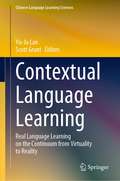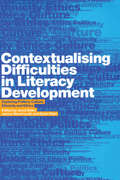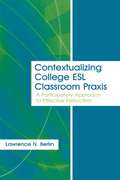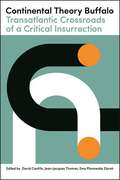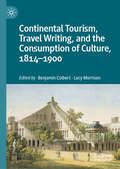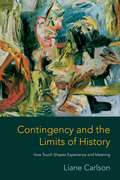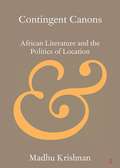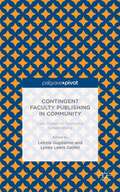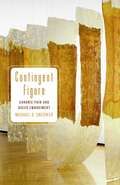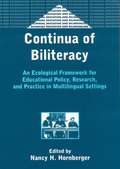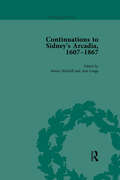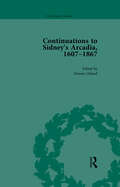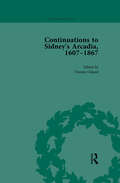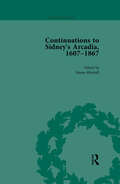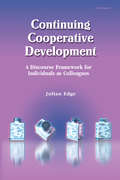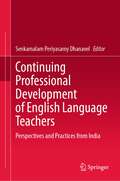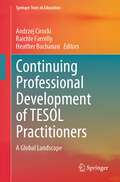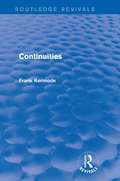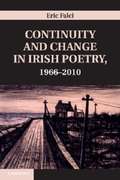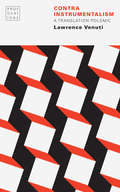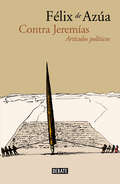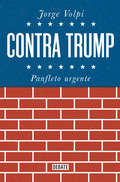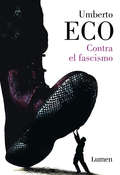- Table View
- List View
Contextual Language Learning: Real Language Learning on the Continuum from Virtuality to Reality (Chinese Language Learning Sciences)
by Yu-Ju Lan Scott GrantThis book presents research and developments in the virtual, augmented technology and mixed-reality used in language learning and teaching. It provides the readers with a comprehensive overview of contextual language learning with the support of immersive technology. From theoretical foundations, methodological issues, the features of virtual and augmented reality, and educational practices of language learning, to the future of immersive technology for and research on language learning. During the past two decades, abundant research on different realities has recognized the potential of language learning in virtual, augmented, and mixed-reality environments (Wang et al., 2020; Lin & Lan, 2015). Given insufficient studies of Chinese learning in immersive contexts reported in existing literature, this book includes several excellent studies about using immersive technologies for Chinese learning in addition to other foreign langue learning, such as English as a foreign language (EFL). Since learning Chinese has grown significantly as a global trend, the authors vitally consolidate and synthesize various theoretical foundations, visions, and recent research and practices in the context of Chinese teaching from broader and more diverse perspectives. On the other hand, the chapters about EFL learning also shed light on the research on contextual language learning. Thus, the chapters included in this book will likely provide readers with a deep and extensive understanding of the potential of the smart combination of immersive technologies and language learning. More issues for future research will undoubtedly be inspired by reading the chapters in this book.
Contextualising Difficulties in Literacy Development: Exploring Politics, Culture, Ethnicity and Ethics
by Gavin Reid Janet Soler Janice WearmouthThis book provides a range of interdisciplinary and international perspectives on difficulties in literacy development. The high-profile team of contributors provide ethical and policy discussions, as well as contextualising individual and collective strategies to addressing difficulties in literacy development. The chapters break new ground by encompassing a wide range of perspectives related to critical literacy, socio-cultural, cognitive, and psychological viewpoints, to help inform practice, policy and research into literacy difficulties. Issues addressed include: *the different ways literacy can be conceptualised through social-science based disciplinary perspectives*the issues at the centre of current public and professional debates surrounding literacy difficulties and how these have impacted upon pedagogical responses *the impact of these wider political and social issues on individual students. This reader forms the basis of the Open University’s Difficulties in Literacy Development course, but will also be of interest to postgraduate students, teachers, researchers, education professionals and policymakers who are keen to address difficulties in literacy development.
Contextualizing College ESL Classroom Praxis: A Participatory Approach to Effective Instruction (Language, Culture, And Teaching Ser.)
by Lawrence N. BerlinContextualizing College ESL Classroom Praxis: A Participatory Approach to Effective Instruction provides pre-service and in-service teachers with a model for engaging in effective instruction with the variety of students encountered in college English as a second language or foreign language classrooms. Along with the model, the text is designed to
Continental Theory Buffalo: Transatlantic Crossroads of a Critical Insurrection (SUNY series, Humanities to the Rescue)
by David R. Castillo, Jean-Jacques Thomas, Ewa Plonowska ZiarekContinental Theory Buffalo is the inaugural volume of the Humanities to the Rescue book series, a public humanities project dedicated to discussing the role of the arts and humanities today. This book is a collaborative act of humanistic renewal that builds on the transcontinental legacy of May 1968 to offer insightful readings of the cultural (d)evolution of the last fifty years. The volume contributors revisit, reclaim and reassess the "revolutionary" legacy of May 1968 in light of the urgency of the present and the future. Their essays are effective illustrations of the potential of such interpretive traditions as philosophy, literature and cultural criticism to run interference with (and offer alternatives to) the instrumentalist logic and predatory structures that are reducing the world to a collection of quantifiable and tradeable resources. The book will be of interest to cultural historians and theorists, media studies scholars, political scientists, and students of French and Francophone literature and culture on both sides of the Atlantic.
Continental Tourism, Travel Writing, and the Consumption of Culture, 1814–1900
by Benjamin Colbert Lucy MorrisonThis book explores the boundaries of British continental travel and tourism in the nineteenth century, stretching from Norway to Bulgaria, from visitors’ albums to missionary efforts, from juvenilia to joint authorship. The essay topics invoke new aesthetics of travel as consumption, travel as satire, and of the developing culture of tourism. Chronologically arranged, the book charts the growth and permutations of this new consumerist ideology of travel driven by the desires of both men and women: the insatiable appetite for new accounts of old routes as well as appropriation of the new; interart reproductions of description and illustration; and wider cultural manifestations of tourism within popular entertainment and domestic settings. Continental tourism provides multiple perspectives with wide-ranging coverage of cultural phenomena increasingly incorporated into and affected by the nineteenth-century continental tour. The essays suggest the coextension of travel alongside experiential boundaries and reveal the emergence of a consumerist attitude toward travel that persists in the present day.
Contingency and the Limits of History: How Touch Shapes Experience and Meaning
by Liane CarlsonCentral to the historicizing work of recent decades has been the concept of contingency, the realm of chance, change, and the unnecessary. Following Nietzsche and Foucault, genealogists have deployed contingency to show that all institutions and ideas could have been otherwise as a critique of the status quo. Yet scholars have spent very little time considering the genealogy of contingency itself—or what its history means for its role in politics.In Contingency and the Limits of History, Liane Carlson historicizes contingency by tying it to its theological and etymological roots in “touch,” contending that much of its critical, disruptive power is specific to our current historical moment. She returns to an older definition of contingency found in Christian theology that understands it as the lot of mortal creatures, who suffer, feel, bleed, and change, in contrast to a necessary, unchanging, impassible God. Far from dying out, Carlson reveals, this theological past persists in continental philosophy, where thinkers such as Novalis, Schelling, Merleau-Ponty, and Serres have imagined contingency as a type of radical destabilization brought about by the body’s collision with a changing world. Through studies of sickness, loneliness, violation, and love, she shows that different experiences of contingency can lead to dramatically dissimilar ethical and political projects. A strikingly original reconsideration of one of continental philosophy and critical theory’s most cherished concepts, this book reveals the limits of historicist accounts.
Contingent Canons: African Literature and the Politics of Location (Elements in Publishing and Book Culture)
by Madhu KrishnanThis Element explores the mechanisms through which 'African literature', as a market category, has been consecrated within the global literary field. Drawing on archival, textual and field-based research, it proposes that the normative story of African literary writing has functioned to efface a broader material history of African literary production located on and oriented to the continent itself.
Contingent Faculty Publishing in Community: Case Studies for Successful Collaborations
by Lynée Lewis Gaillet Letizia GuglielmoContributors argue that the key to innovative teaching and scholarship lies in institutional support for the contingent labor force, and they encourage contingent faculty to organize self-mentoring groups, create venues for learning/disseminating their experiences and findings, and connect scholarship to service and teaching in novel ways.
Contingent Figure: Chronic Pain and Queer Embodiment
by Michael D. SnedikerA masterful synthesis of literary readings and poetic reflections, making profound contributions to our understanding of chronic painAt the intersection of queer theory and disability studies, acclaimed theorist Michael D. Snediker locates something unexpected: chronic pain. Starting from this paradigm-shifting insight, Snediker elaborates a bracing examination of the phenomenological peculiarity of disability, articulating a complex idiom of figuration as the lived substance of pain&’s quotidian. This lexicon helps us differently inhabit both the theoretical and phenomenal dimensions of chronic pain and suffering by illuminating where these modes are least distinguishable. Suffused with fastidious close readings, and girded by a remarkably complex understanding of phenomenal experience, Contingent Figure resides in the overlap between literary theory and lyric experiment. Snediker grounds his exploration of disability and chronic pain in dazzling close readings of Herman Melville, Emily Dickinson, Henry James, and many others. Its juxtaposition of these readings with candid autobiographical accounts makes Contingent Figure an exemplary instance of literary theory as a practice of lyric attention.Thoroughly rigorous and anything but predictable, this stirring inquiry leaves the reader with a rich critical vocabulary indebted to the likes of Maurice Blanchot, Gilles Deleuze, D. O. Winnicott, and Eve Kosofsky Sedgwick. A master class in close reading&’s inseparability from the urgency of lived experience, this book is essential for students and scholars of disability studies, queer theory, formalism, aesthetics, and the radical challenge of Emersonian poetics across the long American nineteenth century.
Contingent Pacifism
by Larry MayIn this, the first major philosophical study of contingent pacifism, Larry May offers a new account of pacifism from within the Just War tradition. Written in a non-technical style, the book features real-life examples from contemporary wars and applies a variety of approaches ranging from traditional pacifism and human rights to international law and conscientious objection. May considers a variety of thinkers and theories, including Hugo Grotius, Kant, Socrates, Seneca on restraint, Tertullian on moral purity, Erasmus's arguments against just war, and Hobbes's conception of public conscience. The guiding idea is that the possibility of a just war is conceded, but not at the current time or in the foreseeable future due to the nature of contemporary armed conflict and geopolitics - wars in the past are also unlikely to have been just wars. This volume will interest scholars and upper-level students of political philosophy, philosophy of law, and war studies.
Continua of Biliteracy
by Nancy H. HornbergerBiliteracy - the use of two or more languages in and around writing- is an inescapable feature of lives and schools worldwide, yet one which most educational policy and practice continue blithely to ignore. The continua of biliteracy featured in the present volume offers a comprehensive yet flexible model to guide educators, researchers, and policy-makers in designing, carrying out, and evaluating educational programs for the development of bilingual and multilingual learners, each program adapted to its own specific context, media, and contents.
Continuations to Sidney's Arcadia, 1607-1867, Volume 1
by Marea Mitchell Dianne Osland Ann LangeSir Philip Sidney’s Arcadia has held a significant place in literary imagination since its inception over 430 years ago. Our four-volume set presents five re-imaginings of the text, as well as two short supplements that attempt to bridge the gap between Sidney’s original and revised versions of the work.
Continuations to Sidney's Arcadia, 1607-1867, Volume 2
by Marea Mitchell Dianne Osland Ann LangeSir Philip Sidney’s Arcadia has held a significant place in literary imagination since its inception over 430 years ago. Our four-volume set presents five re-imaginings of the text, as well as two short supplements that attempt to bridge the gap between Sidney’s original and revised versions of the work.
Continuations to Sidney's Arcadia, 1607-1867, Volume 3
by Marea Mitchell Dianne Osland Ann LangeSir Philip Sidney’s Arcadia has held a significant place in literary imagination since its inception over 430 years ago. Our four-volume set presents five re-imaginings of the text, as well as two short supplements that attempt to bridge the gap between Sidney’s original and revised versions of the work.
Continuations to Sidney's Arcadia, 1607-1867, Volume 4
by Marea Mitchell Dianne Osland Ann LangeSir Philip Sidney’s Arcadia has held a significant place in literary imagination since its inception over 430 years ago. Our four-volume set presents five re-imaginings of the text, as well as two short supplements that attempt to bridge the gap between Sidney’s original and revised versions of the work.
Continuing Cooperative Development: A Discourse Framework for Individuals as Colleagues
by Julian EdgeIn Continuing Cooperative Development, a series of guided tasks helps the reader acquire specific skills of listening and responding that, in turn, help a speaker to express and articulate thoughts and plans that lie just beyond what they knew that they knew. By adopting a certain style of speaking and listening to colleagues for agreed periods of time, motivated professionals can take individual control of their own development and increase the feeling of collegiality in their workplace. Continuing Cooperative Development draws on Edge's experience of more than ten years using this framework worldwide and provides authentic examples to guide the reader. This interactive framework is demonstrated in the book as part of a reflective teaching approach in response to everyday classroom problems, and also as part of a more formal, action-research approach to the formulation of local educational theory. The key theme of this book is the power of non-judgmental discourse to facilitate the development of ideas and action, accessing both cognitive and emotional intelligence. The transcribed and interpreted data of authentic interactions from the Americas, Europe, and Asia serve as evidence for the argument and as guidelines for implementation. The work is set in the field of TESOL, although its relevance reaches across discipline boundaries. The teachers featured in the book have duties ranging from the instruction of young learners to the supervision of doctoral research. The common denominator is that these people are motivated educators, committed to extending their own understanding and developing their own style of being an aware professional.
Continuing Professional Development of English Language Teachers: Perspectives and Practices from India
by Senkamalam Periyasamy DhanavelThis book provides a comprehensive understanding of India's continuing professional development (CPD) landscape. It examines the issues surrounding the professional development of English language teachers in India at the tertiary level from multiple perspectives. Further, it evaluates various models of continuing professional learning (CPL) and emphasizes the transformative model as a solution to the social, administrative, or other impediments teachers encounter in their lives. Importantly, it presents examples, solving academic and non-academic problems in formal and informal, and face-face and technology-mediated forms of teaching and learning by teachers of English in different contexts. It discusses the latest developments in the literature related to the transformative and reflective approach to classroom problems faced by teachers on the ground such as classroom environment, students' socio-economic background, teachers education, and teacher assessment. Also, it positions continuing professional development (CPD) as having transformative power in teaching English in India and how it can improve students' learning opportunities. The book is relevant to English language teachers, teacher educators, and researchers in India and across the globe to address significant issues in the field: how to handle every classroom situation and how to train oneself as a teacher as well as a teacher educator.
Continuing Professional Development of TESOL Practitioners: A Global Landscape (Springer Texts in Education)
by Andrzej Cirocki Heather Buchanan Raichle FarrellyThis textbook serves as a current and comprehensive resource on effective Continuing Professional Development (CPD) for TESOL practitioners in various contexts around the world at various stages in their careers. The practices described by language teachers, teacher educators and professional development providers in this book offer a vision of critical issues to consider when designing and evaluating professional development opportunities. Effective professional development requires careful planning informed by the realities of the local context and the specific needs of the teachers. This textbook is designed to support those who provide professional development opportunities by presenting global perspectives on professional development for a range of teaching contexts at different language levels. Each chapter includes a discussion about the type and source of support available in the given context, as well as a reflection on the challenges that exist for both teachers and CPD providers. These insights serve to help CPD designers and providers as they problematize teacher development opportunities in their context. Each chapter concludes with a synthesis of the strengths of CPD in the local context and a discussion of future directions that target opportunities for transformation and improvement. This volume celebrates teachers, teacher educators and CPD providers around the world. High-impact practices are presented from fifteen countries: Cameroon, Canada, Costa Rica, Indonesia, Kazakhstan, Malta, New Zealand, Norway, Oman, Qatar, South Africa, South Korea, Sri Lanka, Tanzania and the United States of America.
Continuities (Routledge Revivals)
by Sir Frank KermodeContinuities, first published in 1968, is a collection of reviews by Frank Kermode that appeared from 1962 to 1967. Kermode discusses a variety of novelists, poets, and critics, including T. S. Eliot, Northrop Frye, Wallace Stevens, Edmund Wilson, and Wallace Stevens. History and politics are two important aspects that are discussed in regards to these writers. This book is ideal for students of English literature.
Continuity and Change in Irish Poetry, 1966–2010
by Eric FalciIn this book, Eric Falci reshapes the story of Irish poetry since the 1960s. He shows how polemical arguments concerning the role of poetry in 1960s Ireland evolve into a set of formal and compositional strategies for emerging Irish poets in the mid 1970s and beyond. His study presents a cohesive picture of the relationship between Northern Irish poetry from the Republic of Ireland since World War II and traces the lineage of lyric practice from a unique historical perspective. At the same time, it recontextualizes late twentieth-century Irish poetry within the long Irish poetic tradition, places Irish writing more accurately within the field of postwar Anglophone poetry and offers a new account of lyric's critical capacities. Of interest to Irish studies and twentieth-century poetry specialists, this book provides a much-needed guide to some of the most inventive and notable poetry written in the past forty years.
Contra Instrumentalism: A Translation Polemic (Provocations)
by Lawrence VenutiContra Instrumentalism questions the long-accepted notion that translation reproduces or transfers an invariant contained in or caused by the source text. This “instrumental” model of translation has dominated translation theory and commentary for more than two millennia, and its influence can be seen today in elite and popular cultures, in academic institutions and in publishing, in scholarly monographs and in literary journalism, in the most rarefied theoretical discourses and in the most commonly used clichés.Contra Instrumentalism aims to end the dominance of instrumentalism by showing how it grossly oversimplifies translation practice and fosters an illusion of immediate access to source texts. Lawrence Venuti asserts that all translation is an interpretive act that necessarily entails ethical responsibilities and political commitments. Venuti argues that a hermeneutic model offers a more comprehensive and incisive understanding of translation that enables an appreciation of not only the creative and scholarly aspects of what a translator does but also the crucial role translation plays in the cultural and social institutions that shape human life.
Contra Jeremías: Artículos políticos
by Félix de AzúaUna antología de los mejores ensayos de Félix de Azúa sobre cuestiones políticas y sociales. A lo largo de estos artículos, escritos entre 2007 y 2012, Félix de Azúa, con la lucidez, el valor y el sentido del humor que le caracterizan, analiza el nacimiento y el desarrollo de la crisis que está cambiando traumáticamente la política en todo el mundo. Los nacionalismos, la evolución de la izquierda, la herencia del siglo xx, la corrupción, la justicia, las mutaciones de la democracia o las convulsiones de Europa son algunos de los asuntos que se abordan en estas páginas iluminadoras, contundentes, una invitación a pensar nuestro presente sin los anteojos de las ideas recibidas. «Eso es, para mí, la política en su sentido más honesto: lo que cada cual lleva a cabo desde su responsabilidad, con imaginación e iniciativa, para impedir los atropellos del poder.»Félix de Azúa
Contra Trump: Panfleto urgente
by Jorge VolpiCon el mejor estilo de los panfletos y libelos políticos de los siglos XIX y XX, Jorge Volpi alza la voz en contra de Trump, sus ideas y sus acciones. ¿Por qué Donald Trump fue electo presidente de Estados Unidos? Su victoria electoral dice mucho sobre el país más poderoso del mundo y sus ciudadanos, pero también sobre nosotros como sociedad. Ahora, ante la xenofobia, la misoginia, el nacionalismo, el populismo y otros azotes característicos de ese régimen, ¿cuáles son las mayores amenazas para México? Jorge Volpi propone un entendimiento claro y racional de su peligroso pensamiento, y también políticas, contrapesos y resistencias a las peores lacras de su administración.
Contra el fascismo
by Umberto EcoLas catorce claves de Umberto Eco para reconocer el fascismo: un manifiesto urgente. «Un genio inagotable, voraz, que construye y deconstruye sin cesar, de inteligencia deslumbrante y humorística cuando hace falta.»Mercedes Monmany, ABC «Uno de los pensadores más influyentes de nuestro tiempo.»Los Angeles Times «El fascismo eterno aún nos rodea, aunque lleve traje de paisano. Puede volver en cualquier momento, aunque se disfrace de las formas más inocuas. Nuestro deber es detectarlo, quitarle la máscara y denunciar en voz alta cada una de sus gestas.» En esta conferencia dirigida a los alumnos de una universidad norteamericana en 1995, Umberto Eco alertaba frente a la sombra alargada de un fenómeno que no se restringe al ámbito político ni tiene fecha de caducidad, porque tras un régimen y una ideología hay siempre un cierto modo de pensar y de sentir, un sustrato cultural que puede ser el germen de una nueva ola fascista. El gran pensador de nuestro tiempo, aquel que nos enseñó a «reflexionar antes de pensar», nos ofrece catorce claves para reconocer el fantasma del «fascismo eterno» y nos brinda instrumentos para que el presente y el futuro no se parezcan a nuestro peor pasado. La crítica ha dicho...«Una invitación a la memoria, para que nunca demos algo por superado.»Furio Colombo, Il Fatto Quotidiano «Muy convincente y con la clase de destellos de inteligencia y conocimiento que los lectores esperan de una de las mentes más brillantes de Italia.»Library Journal «Eco mezcla recuerdos personales de su juventud bajo el régimen fascista y analiza estructuralmente los catorce arquetipos del fascismo primitivo y eterno.»Babelio «Sesenta y cuatro páginas fáciles de leer que nos recuerdan que el fascismo tiene más de una cara y que puede volver a surgir bajo otros hábitos.»France Inter «Umberto Eco sugiere que existe un fascismo eterno cuyas características, aunque en aparencia contradictorias o inocentes, siguen entre nosotros.»Il Manifesto «Eco explica el nexo inseparable entre libertad y Liberación (del fascismo).»Paolo di Paolo, L'Espresso
Contra el fascismo
by Umberto EcoLas catorce claves de Umberto Eco para reconocer el fascismo: un manifiesto urgente. «Umberto Eco cambió nuestra mirada sobre los libros: imprescindibles, pequeños, frágiles, a veces criminales, casi siempre salvadores. Un maestro que nos enseñó a entrelazar la sabiduría y el juego con su estilo sagaz y lúdico, con su asombrosa inventiva y certera lucidez.»Irene Vallejo «Uno de los pensadores más influyentes de nuestro tiempo.»Los Angeles Times «El fascismo eterno aún nos rodea, aunque lleve traje de paisano. Puede volver en cualquier momento, aunque se disfrace de las formas más inocuas. Nuestro deber es detectarlo, quitarle la máscara y denunciar en voz alta cada una de sus gestas.» En esta conferencia dirigida a los alumnos de una universidad norteamericana en 1995, Umberto Eco alertaba frente a la sombra alargada de un fenómeno que no se restringe al ámbito político ni tiene fecha de caducidad, porque tras un régimen y una ideología hay siempre un cierto modo de pensar y de sentir, un sustrato cultural que puede ser el germen de una nueva ola fascista. El gran pensador de nuestro tiempo, aquel que nos enseñó a «reflexionar antes de pensar», nos ofrece catorce claves para reconocer el fantasma del «fascismo eterno» y nos brinda instrumentos para que el presente y el futuro no se parezcan a nuestro peor pasado. La crítica ha dicho...«El fascismo es un monstruo con muchas caras. Hace casi 25 años, Umberto Eco advertía sobre esta cuestión que a día de hoy ha adquirido una importancia caudal y una urgencia realmente inquietante.»Diari de Girona «Una invitación a la memoria, para que nunca demos algo por superado.»Furio Colombo, Il Fatto Quotidiano «Muy convincente y con la clase de destellos de inteligencia y conocimiento que los lectores esperan de una de las mentes más brillantes de Italia.»Library Journal «Eco mezcla recuerdos personales de su juventud bajo el régimen fascista y analiza estructuralmente los catorce arquetipos del fascismo primitivo y eterno.»Babelio «Cabe en el bolsillo de una americana, tiene 61 páginas y concreción suficiente para funcionar como un ibuprofeno.»Karina Sainz Borgo, Voz Pópuli «Sesenta y cuatro páginas fáciles de leer que nos recuerdan que el fascismo tiene más de una cara y que puede volver a surgir bajo otros hábitos.»France Inter «Umberto Eco sugiere que existe un fascismo eterno cuyas características, aunque en aparencia contradictorias o inocentes, siguen entre nosotros.»Il Manifesto «Eco explica el nexo inseparable entre libertad y Liberación (del fascismo).»Paolo di Paolo, L'Espresso «Un genio inagotable, voraz, que construye y deconstruye sin cesar, de inteligencia deslumbrante y humorística cuando hace falta.»Mercedes Monmany, ABC «Un manifiesto urgente, y yo añadiría que necesario, en la actualidad que vivimos.»Jesús Cabaleiro Larrán, Periodistas en Español
